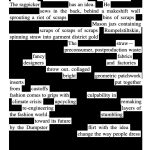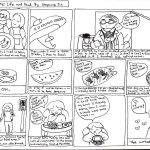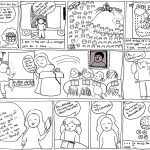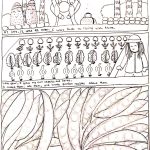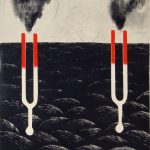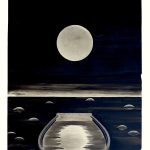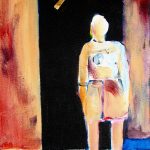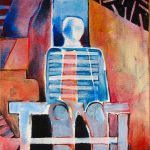“Two people who know they do not understand each other, breeding children whom they do not understand and who will never understand them.” —T.S. Eliot, The Cocktail Party
My parents met in a nightclub on Catalina Island. My mother was 28, my father 26. My father was on the island with a group of friends, childhood buddies from Ohio who had all moved to southern California together after WWII. My mother, born and raised in Los Angeles, was visiting with her best friend. The story goes that my dad begged her to dance. Later, when my mother refused to go back to his hotel with him, he called her a prude. She vowed that anyone who called her a prude would have to marry her, and six months later, that’s exactly what happened. Growing up, I never understood what one thing had to do with the other, and when I asked, they simply answered “Cocktails.”
—
It’s widely accepted that the creator of cocktail parties is Mrs. Julius Walsh of St. Louis, Missouri. In May 1917, The St. Paul Pioneer Press reported that Mrs. Walsh invited fifty guests to her house on a Sunday at high noon for a one-hour gathering. The event was an instant hit, and within weeks cocktail parties became a St. Louis institution. The first known cocktail party in England was held seven years later, in 1924. In T.S. Eliot’s dark comic play, The Cocktail Party, a wife leaves her husband just as they are about to host a cocktail party in their London home. The husband must devise an explanation for her absence to keep up with social appearances. The wife returns with a mysterious guest, a psychologist who counsels the couple individually. As the play progresses, husband and wife come to realize the ways they have been deceiving themselves. Two years later, and better adjusted, they host another cocktail party.
—
Things I hated growing up: My parents’ fights. Rain. The letdown after Christmas. Cocktail parties.
—
By 1960, my parents had traded the San Fernando Valley for the small town of Thousand Oaks, a place where everybody knew everybody. Our house sat on a small street with one house next door and three across the street. One end poured into a winding avenue with rounded cul-de-sacs full of one- and two-story houses with bikes and dolls and skateboards littering their yards. The other end opened to a main road with a round hills beyond it.
These were the years punctuated by my parents’ fights. Although I knew from the sitcoms we watched on television that this was not considered the normal behavior of a married couple, it was all I knew from my mother and father. After the move to Thousand Oaks, my dad had close to an hour drive to and from Los Angeles every day for work, and when he was late, it was easy to blame the traffic. My mother suspected otherwise. She resorted to all the stereotypical tricks of jealous women: scouring through his jacket pockets, demanding to know what happened to his missing cufflink, why it took him three goddamn hours to get home.
“And don’t tell me traffic. Your secretary said you haven’t been in the office all afternoon. Where were you? Who is she? I can smell her sleazy perfume all over you, you sonofabitch.”
My dad ignored her as best he could. Because of his easygoing nature, it seemed to the three of us kids that she was the one always picking a fight. Their arguments grew worse before a holiday, birthday party, or vacation, when it seemed like my mother held on to any insecurities or suspicions for as long as she could, erupting into a tirade threatening to disrupt even the most rock-solid plans. More than once my mother blamed my dad as she called off our plans. We’d go to bed, anxious and disappointed, only to be roused early in the morning with instructions to “Get up. Get dressed. We’re going.”
The morning of my tenth birthday party, after a particularly horrible argument broke out, my mother accusing my dad of yet another affair, she threw her hands in the air and said, “That’s it! Call your friends and tell them you’re not having a party because your father can’t keep it in his pants!”
My dad, trying his best to console me through my tears as well as reason with my mother, fought back. “Leave her and the kids out of it. Look what you’re doing!”
“You’re doing this! I’m not doing a thing!”
I had made most of the phone calls, claiming a sudden stomachache, when my mother, subdued and placated, told me to call my friends back. I was going to have my party, after all.
—
The cocktail parties began around the time I was in the third grade and ended by the time I finished sixth. My mother chose early January for their annual shindig, allowing for the Christmas rush to abate but for the tree and decorations to remain in full display.
My parents’ loud arguments intensified right before a cocktail party, tapering off just long enough to get through the night, only to resurface again the next day. My mother yelled at my dad for the attention he gave or that was given to him by their female guests. “I saw the way you looked at that hussy!” or “Joanna was hanging all over you!”
My dad’s friends were another source of aggravation. A tight-knit group, they were party regulars. My mother couldn’t stand them. An extrovert, my father became louder and sillier among his friends, their talk always revolving around wild teenage shenanigans, like when my dad was eighteen and followed an older married woman from Ohio to Texas, or the foray into a whorehouse at fifteen. There were so many of them, stories as well as friends. Jim, a dark-haired painter, and his wife Millie, a brassy blonde with a wide smile. Cat and Fat, twins with their respective spouses. Louie, a loud Italian with a big heart, accompanied by his current lady of the season. Bill with the ready laugh was on his second marriage to Carolyn, a younger, pretty brunette with aspirations of becoming a pilot. My mother liked Carolyn, and I did, too. She and Bill had no children together and would divorce before having any of their own, but not before Carolyn learned to fly.
Our neighbors came too, couples whose wives my mother met through work and parents of friends of mine and my siblings. This last group never ceased to amaze me, the eagerness with which they reached for their drinks, their voices rising with each glass. My best friend Lauren’s mother—glum Mrs. Stenson, who barely said a word when I was at their house—became radiant after a glass or two. Henry and Deidre Hand lived directly across the street. Henry was British with bad teeth, Deidre a feisty Irish redhead. She had a reputation in the neighborhood for watering her front yard wearing a one-piece bathing suit, bending over low to the ground as she maneuvered the hose over every crack in the driveway.
My parents paraded my brother and sister and me around to prove or disprove claims of inches grown or braces that worked wonders. I felt like the holiday lights or the rosebud-trimmed china: something brought out once a year. We always wore the new flannel pajamas we received at Christmas, Bobby in something boyish and blue, Kathy and I in pink and green flowers.
“Oh, aren’t you just the spitting image of your mother,” I heard over and over as I glanced at my mother, refusing to see any resemblance at all. My dad put his hands on my brother’s shoulders, steering him into the thick of his childhood buddies, where he was greeted by elbow nudges and “Hey, Bobbo!” Kathy worked the crowd with an innate flair, her long golden ponytail bouncing up and down. When the show was over, it was off to bed with orders to keep doors shut and no getting up for water. Shy and introverted, I welcomed our bedroom banishment. My stomach twisted with each ring of the doorbell, flip-flopped as I witnessed my parents shapeshift into characters I didn’t recognize. My outgoing dad upped his enthusiasm, greeted everyone exuberantly, entertained with dancing and jokes, and made sure everyone had a fresh drink in hand. My mother, naturally quieter, with just a few friends she considered close and always critical of everyone and everything, revamped into a chirpy, playful hostess: “Oh Bill, no one tells that story like you do” and “Louie, your spaghetti sauce is divine. I must have the recipe. Don’t go holding out on me now.”
It was impossible to reconcile these two revelers with my parents.
—
Once my sister and I had retreated into our room, I lay awake worried that someone would open the door by accident, thinking it was the bathroom. I worried that someone might stray where they didn’t belong.
It happened once. I was nine, ten, eleven; I don’t quite remember. After a few whispered minutes, my sister fell asleep, leaving me to listen to the muted sounds of the party slip under our closed bedroom door.
I heard the doorknob turn before I noticed its slow circular motion. A man, my dad, stood in the doorway, checking in on me and my sister. I sat up in bed, happy to see him.
“Daddy!”
Only he wasn’t my dad. My bedroom was dark. The only light came in from the hallway, dim from the lamps lit in the living room. His features were shadowed, the light at his back, becoming clearer as he stumbled into my room.
Things I noticed: The clock showing 11:20. Frank and Nancy Sinatra’s “Something Stupid” playing on the stereo. A woman’s raucous laughter from the living room, followed by male bellowing. My fear. Henry Hand approaching.
The overbearing smell of alcohol clung to him like a stale second skin. I glanced at my sister, asleep in her bed, hoping he wouldn’t see her.
I lay back in bed, clutching the blankets closer.
“Hullo. Still awake are you?” He walked farther into my room and softly laughed. “Oh, you thought I was your daddy?”
I may have nodded, may have said yes. I wanted to yell, wanted to call for my parents, wanted to tell him my dad would be right back, wanted my dad to be right back, wanted to be anything but a terrified girl.
He peered over the side of my bed. The smell of alcohol was sticky, clung to his speech, slurring his accent. “Do you like me? Are you afraid of me?”
I might have said yes. I might have stayed silent.
He sat down on the edge of my bed.
“Of course you like me. There’s nothing to be scared of, love.” He traced his fingers along my arm. “I like you, too.”
I shut my eyes as I began to feel outside of my body. I pulled the blankets over my head, scooting away from him as I felt his weight lean over the bed. He might have squeezed my leg before getting up from my bed, or he might have grazed his hand over my body, lingering toward my thighs before walking out, closing the door behind him.
The next morning I scanned the living room, noticing traces of the night before, from the half-empty glasses scattered across tables in the living room to the sleep deprivation in my mother’s green eyes. As she complained of the mess, I told her that Henry Hand had come into my bedroom.
She hesitated before answering, and I noticed the briefest flicker of alarm rise in her eyes. “You must have had a bad dream.”
“No, I was still awake. I couldn’t sleep with all the noise.”
“Oh, it wasn’t that loud. I’m sure it was just a dream.”
“No, it wasn’t a dream. I would know if it was a dream. He came into my room and—”
“You don’t need to worry, lots of dreams seem real.”
—
A handful of black-and-white Polaroid photographs remain as evidence of my parents’ cocktail parties. The women are adorned in their cocktail dresses and Colgate smiles, the men more casual in their attire but every bit as dazzling in their charm. Hemlines were longer than hairstyles, as women favored the short, bouffant style trendy at the time, except Carolyn, who was the first of the group to wear a miniskirt, and she wore it proud.
In one shot, my dad, Jim and Millie, Bill and Carolyn, and an unidentified couple sit scattered on our cream-colored sofa. Maybe my mother took the picture, as she’s nowhere in the frame. Everyone is smiling, some looking at the camera, others looking at each other. In another picture, Millie turns to Carolyn, Carolyn’s head thrown back in laughter. My mother sits off to the side, in conversation with a woman I don’t recognize. In another, my dad sits in the middle of our small sofa, Louie and Fat flanking either side. My dad’s blue eyes are closed, his hands outstretched and his mouth open, as if in the middle of a song. I’m struck by how young he looks, how young they all look, much younger than in my memories of them. All of them younger than I am now. It’s easy to see how things could get past them.

